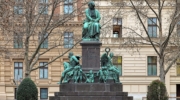#Ode2Joy Challenge showcased during the Berlin Summit
The European Cultural Heritage Summit in Berlin (18-24 June), being one of the key events of the European Year of Cultural Heritage, provided an ideal platform to showcase a selection of inspiring and creative contributions to the #Ode2Joy Challenge from all over Europe. On this occasion, the exceptional interpretation by the Maltese tenor Joseph Calleja was premiered and set the tone of the European Policy Debate Concluding Session on 22 June. Later that evening, video clips compiling a selection of “Ode to Joy” reinterpretations were shown during the European Heritage Awards Ceremony to the delight of Maestro Plácido Domingo, Frank-Walter Steinmeier, Federal President of Germany, Tibor Navracsics, EU Commissioner for Culture, and the 800 participants in the audience.
The #Ode2Joy Challenge was also mentioned during the Creative Session “Communicating Heritage in the 21st Century” on 20 June by the Secretary General of Europa Nostra. She shared with the audience the inspiring video contribution of the #Euphonia project filmed at BASE Milano to emphasize that cultural heritage is a powerful tool to tell the story of Europe in a more creative and engaging way.
The selected contributions were not only positive and heartwarming, many were original, personal, emotional and sometimes very funny. From renowned artists such as the Portuguese fado singer Katia Guerreiro, famous choral ensembles such as the RTÉ Philharmonic Choir from Ireland, school orchestras and choirs such as the Banda Municipal de Lleida from Spain, Flashmobs as organised in Mons (Belgium), European policy-makers like the EU Commissioner Tibor Navracsics or the Board of Europa Nostra, to enthusiastic European citizens like Eva and her violin teacher Katia, they have all accepted the challenge to make their own “Ode to Europe”.
The participation of several members of the European Heritage Alliance 3.3 through their own EYCH initiatives gave a particularly symbolic European dimension to the challenge. ERIH (European Route of Industrial Heritage) took part with its “WORK it OUT” dance event recorded at industrial heritage sites across Europe. EFAITH (European Federation of Associations of Industrial and Technical Heritage) contributed no less than 14 ‘Serenade for a Factory Chimney‘ videos from factories in 7 European countries. Last but not least, the European Historic Houses Association organised the first European concert with Le Dimore del Quartetto held at Castle of Grand Bigard in Belgium.
The Challenge even reached countries outside of the European Union and other continents through the large network of European delegations. The EU Info Centre in Bosnia and Herzegovina organised a rock concert and special projection of the EU flag on the beautiful Jajce waterfall in Mostar. In the US, the Choral Arts Society of Washington DC got a little creative in singing the “Ode to Joy”, and in Liberia, the youth group Dream Dance Crew performed a traditional dance interpretation of the European Anthem.
The #Ode2Joy Challenge is a participatory social media initiative launched by Europa Nostra and its President Maestro Plácido Domingo celebrating our shared heritage and values on the occasion of the European Year of Cultural Heritage 2018. Since it successfully kicked-off on 9 May 2018 – Europe Day-, already more than 100 reinterpretations from over 25 countries across Europe and beyond of the Beethoven’s “Ode to Joy” – the European Anthem – have been filmed at heritage sites and shared via social media.
The challenge will continue until 9 May 2019, symbolic day when EU Leaders will discuss the future of the Union at a European Council held in Sibiu, Romania.
For more information on how to participate in the challenge, please visit: www.ode2joy.eu






